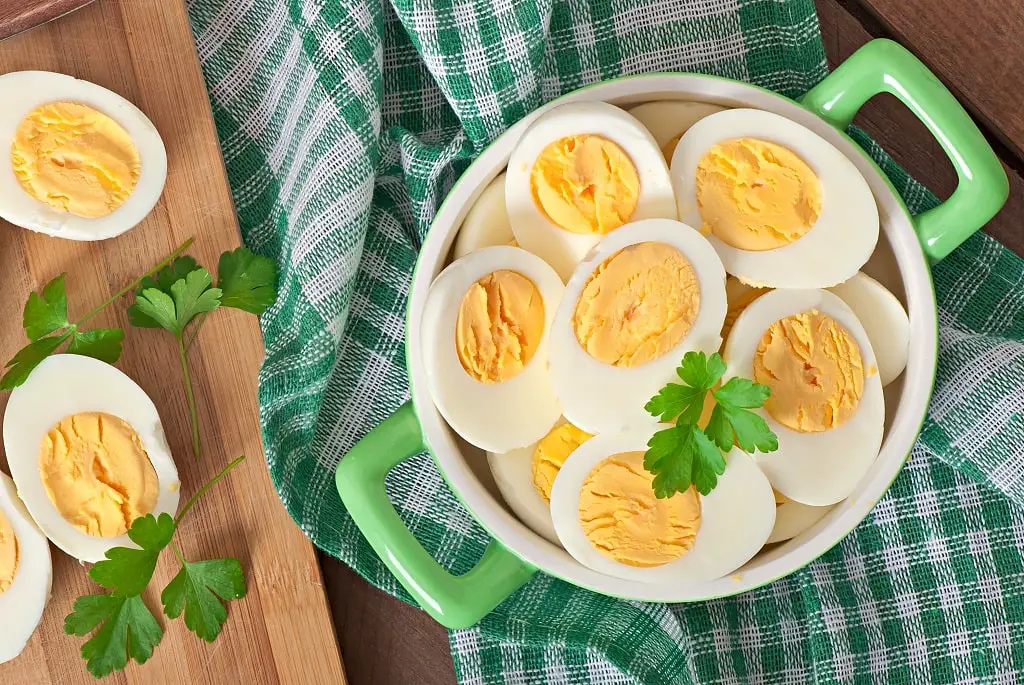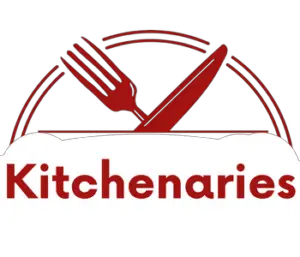This post contains affiliate links. When you buy through our links, we may earn a commission.
All of us have come across over boiled eggs gone spoiled. Ever we think, what happens if over-cook eggs? Knowingly, sometimes we boil eggs for hours let them go rubbery. To cook eggs is of three stages, soft boiled, medium and hard-boiled eggs.
Eggs require three and a half minutes get cooked. Soft boiled white and yellow yolks result as three minute boiling. Firm yolks are possibly arriving heating eggs perfectly for 6 to 7 minutes. For more than 10 minutes, the eggs go hard result in rubbery cooked eggs.

Cooking mode and the savory type we determine to cook are the depending factors for cooked-egg perfection. Over-cooked eggs release poisonous gas that makes the food unsafe to intake as egg whites surplus in sulfur.
- Why is cooking an irreversible change?
- Why is cooking an egg a chemical reaction?
- What type of reaction is cooking an egg?
- Why do eggs harden when cooked?
- Do overcooking eggs kill proteins?
- Can you get sick from over-cooked eggs?
- How do eggs change when cooked?
- Are over-cooked eggs safe to eat?
- What happens when you fry an egg?
- Is boiling an egg physical or chemical?
- Is frying an egg physical or chemical?
- How long should you cook your eggs?
- Is it bad over-cooking scrambled eggs?
- Are 20 minutes too long to boil eggs?
- How long should you cook your eggs?
Why is cooking an irreversible change?
Though egg play a key role, over-cooked and under-cooked do spot importance. Cooking is an irreversible process. Practical possibilities are null to return the raw ingredients that went cooked. We learned reversible and irreversible changes in our childhood. Cooking falls under the irreversible category.
Change in the matter is not reversible in all facts. Material and its states get reversed to the original form after a reaction. Some of them are irreversible. Cooking is the best example of irreversible change. Here the cooked ingredients are impossible to return as raw materials.
Not just cooking but baking, burning, heating, mixing, frying, and rusting are few other examples of irreversible changes. The resultant products never return to the initial stage in case of irreversible changes.
Why is cooking an egg a chemical reaction?
The egg undergoes a chemical reaction while cooking. Sulfur is the chemical component that is abundant in whites of the egg. This chemical component interacts with the hydrogen on heating to release hydrogen sulfide, a hazardous gas.
The release of poisonous gas tells us a chemical reaction occurred while cooking an egg. The white of the egg is also rich in iron that reacts with sulfide to give iron sulfide. You may spot green linings within the white matter due to iron sulfide formation predicting that the egg is not fit for ingestion.
Eggs contain gel-like substances within the shell. When heating, substances transform into collaged matter. Over-heating changes the collagen into hard and rubbery.
What type of reaction is cooking an egg?
It’s a chemical change in the cooking process because once cooked egg does not regain its structure. Egg whites and yolk subjected to heat changes chemically into varying proteins. This change is not reversible, possibly.
Cooking is a fun task. Frying, boiling, heating, and melting are different processes involved in cooking. Reversible and irreversible depends on the method chosen for cooking.
For instance, melting is a reversible process still frying falls under the irreversible category. So, cooking an egg varies to the degree of heating but not reversed anymore.
Why do eggs harden when cooked?
Heat denatures the egg. The proteins break while heating and further links to other proteins forming a new shape. Now, water-surrounded liquid protein is released makes the egg harder. Heating eggs for prolonged hours result in harder eggs cooked.
Slow-cooked eggs are not hard-boiled ones. But hard eggs result in prolonged boiling at high temperatures. Naturally, the shell envelopes egg white and yolk those are rich in amino acids. Raw egg comprises a different form of protein that gets altered after cooking.
The amino acids link each other as an altered chain of amino acids. The process is called denaturation, hard-boil eggs result.
Do overcooking eggs kill proteins?
Heat breaks or unfolds the amino acids. Thereby proteins are broken down when cooked. Eggs do not lack proteins after cooked but denature to some other form. Both boiled and fried eggs contain proteins but differ in the ratio.
Boiled eggs contain proteins that are digestible 180 percent compared to the raw eggs. The protein ratio in boiled eggs and fried eggs per 100 grams is 12 and 13.6 Gms.
Substantially, proteins in eggs are not destroyed but retain in alternate forms. Like eggs, proteins in meat remain by heating.
Can you get sick from over-cooked eggs?
Do you over-cook your eggs? Have they gone harder with similar rubbery? Avoid consuming those eggs. It may not go vital but produce predictable counteractions within. The poisonous gas released is not advisable to intake.
Besides, it is suggestive that green lined cooked-eggs are not edible. Again, it may not bring severity but bothers digestion. Falling sick is indispensable when intake over-cooked eggs. It is advisable not to intake over boil eggs for that individual who underwent surgery.
How do eggs change when cooked?
Heat makes the egg to change its texture and shape. It is the chemical change and irreversible giving firm but tender cooked eggs. Generally, proteins denature on heating leaves a solidified and firm white ball.
The tender but firm egg whites shelling the yellow inside result with quick-cooking of eggs. Perhaps, harder, rigid eggs pop out on prolonged heating. Cooking makes changes within the egg but retain them consumable.
Are over-cooked eggs safe to eat?
No. Over-cooking spoils and hardens the egg that makes it rubbery. Altered alignment of the proteins makes the eggs more rigid also bothers digestion. Poisonous gas release, discoloration of whites declares that the overcooked eggs are unsafe to eat.
Though not vital against life, consuming overcooked eggs considered bad. Dispose of overcooked eggs despite eating. There is nothing to do with spoiled white balls.
What happens when you fry an egg?
Egg-proteins are longer that uncurls when heating. Denaturing helps new bonding of proteins so, frying the eggs is similar to boiling. Moreover, fried eggs contain higher protein compared to boiled eggs.
On the other hand, fried meals are prone to raise LDL cholesterols. Heart diseases are at stake with LDL cholesterols rich foods. Inversely HDL cholesterols serve as a good source for heart health. So, fried eggs are avoidable since rich in protein content.
Is boiling an egg physical or chemical?
Boiling an egg is chemical. The heat taken by the egg can cause molecular changes within the proteins. This change is irreversible and makes the egg soft and tender.
The new chemical bond formed within the amino acid chain alters the state of matter that is irreversible. Boiling or cooking an egg is a chemical reaction.
Is frying an egg physical or chemical?
Frying involves heat application and is a chemical reaction. The uncurled proteins create new chemical bonding within the amino acid chain. Hence new particles are formed result.
Eggs are prone to change matter on heating that is purely chemical and suggests heat application.
How long should you cook your eggs?
Cooking eggs takes three and a half minutes to turn the liquid content into a soft gel. Egg doneness within 6-7 minutes is the perfect timing. Tender but firm egg results within the period.
Cooking beyond 7 minutes is considered an over-cook. Rotten smelling along with greenish lining noticed with after peeling the egg. Don’t confuse slow-cook and over-cook.
Slow-cook involves cool water to boiling an egg. Over-cook is an unnoticed egg cooked for prolonged hours.
Is it bad over-cooking scrambled eggs?
Over-cooking is not recommended anywhere in the process. It may drag your attention and spoil the food browned or burnt.
Scrambled eggs need low heat and slow-cook. Eggs to be scrambled do not thrive in high heat. Avoid high heat for a long time while scrambling eggs.
Are 20 minutes too long to boil eggs?
The 20 minutes is too long to cook the eggs. As I told three and a half minutes is more than enough to cook eggs. Soft and gel consistency achieved within the egg.
Cooking eggs for more than 7 minutes is considered over-cook. Slow-cooking permitted within this period using cool water.
How long should you cook your eggs?
Firm but the tender boiled egg obtained when boiling for 5 minutes. Otherwise, boil water till its boiling point. Remove the pan and add eggs. Close the pan and set it for 17 to 20 minutes.
You can observe firmly cooked eggs within this period and considered the best timing to boil eggs.
The Bottom Line
Boiling eggs to meet doneness is the fine art of cooking. Avoid too much timing just because of your dragged attention. We all met with over-cooked eggs in our lifetime. Turn off your stove once added the eggs.
Slow-cooking is the best option for cooking. The process gives tender eggs that stand firm with no green lining or rotten smell in the slow-cooking process.
Hope! The article is useful. You enjoyed it. Make fun with cooking.
